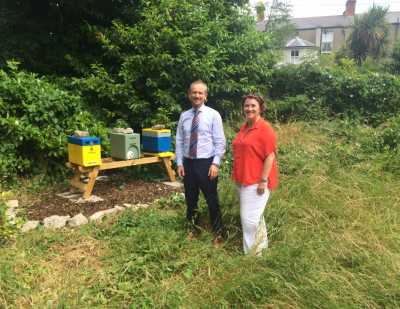 The Representative Body of the Church of Ireland has recently taken delivery of three hives of honey-bees to its offices in Rathmines, and the Church of Ireland Theological Institute has received four hives to situate on its grounds. Ms Fern Jolley, Property Officer, worked with the Dublin County Beekeepers’ Association to choose suitable spots for the hives to be placed, so that the bee keeper can care for them during the year as they settle in to their new homes.
The Representative Body of the Church of Ireland has recently taken delivery of three hives of honey-bees to its offices in Rathmines, and the Church of Ireland Theological Institute has received four hives to situate on its grounds. Ms Fern Jolley, Property Officer, worked with the Dublin County Beekeepers’ Association to choose suitable spots for the hives to be placed, so that the bee keeper can care for them during the year as they settle in to their new homes.
The RCB has also signed up as a business member of the All-Ireland Pollinator Plan. This plan is open to all businesses: no need to have bees at the office to sign up, but simply agree to undertake some actions to welcome and encourage pollinators and pollinator-friendly habitats, and you’ll be sent a certificate to display and added to the list of supporters on the website at http://pollinators.ie/. Actions can be logged and mapped online to track new pollinator-friendly habitats being created by community groups, businesses, councils, schools, and individuals. For its initial actions, the RCB will be planting pollinator-friendly shrubs and herbs and has signed up to a pesticide plan, under which pesticides will be used only sparingly and never on flower-rich areas or pollinator nesting sites. The RCB’s actions are part of an ongoing and growing movement across the Church of Ireland to protect the environment and its creatures – from graveyards in Myross, Co. Cork (https://www.ireland.anglican.org/news/8130/eco-approach-to-rural-churchyard) to churchyards in Co. Wicklow (https://www.independent.ie/regionals/wicklowpeople/news/project-to-turn-church-yards-into-wildlife-havens-36980900.html).
These projects and initiatives are part of the Church of Ireland’s Environmental Charter, passed by the General Synod in 2015, which calls all members of the Church to the duty of environmental stewardship of God’s creation, locally, nationally and internationally.
Photo: Mr David Ritchie, Chief Office and Secretary General, and Ms Fern Jolley, Property Officer, with the Representative Church Body’s new bee hives.
